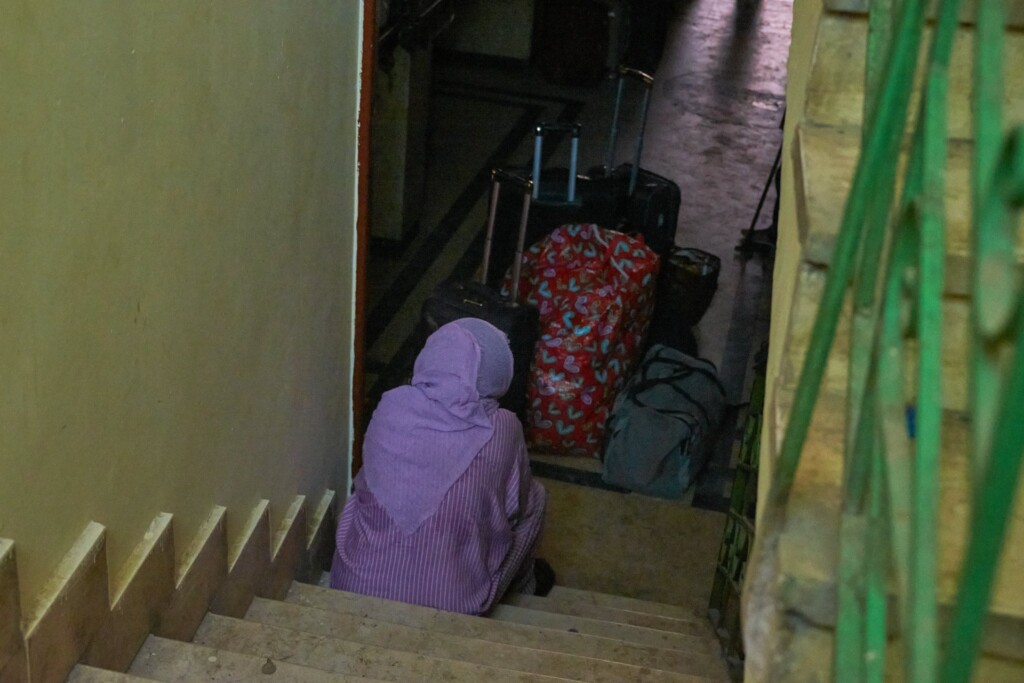Observatory condemns ‘catastrophic level’ of human rights in Sudan

Sudanese woman sits next to luggage after fleeing the Sudan war to Aswan in Egypt (Sari Omer / social media)
The Sudanese Observatory for Human Rights has called the war between the Sudan Armed Forces (SAF) and Rapid Support Forces (RSF) “a war directed primarily against civilians by both parties” in a report obtained by Radio Dabanga. “As it expands, the human rights situation continues to deteriorate to a catastrophic level.”
The observatory stated that the war has been marked by airstrikes and attacks on populated areas, rape, and detention of civilians, destroying civilian infrastructure, mass displacement, impoverishment, tearing apart the social fabric of the country, and stifling Sudanese people’s aspirations for peace, freedom, and justice.
ACLED Armed Conflict Locations and Events Data Project has recorded over 3,250 battles between the Sudanese army and the RSF, resulting in more than 12,190 deaths, most of them civilians.
The observatory report also confirmed that the RSF and their allied militias committed many war crimes in West Darfur, including ethnic cleansing and genocide. On December 29, the SAF committed a massacre in Nyala, South Darfur, by throwing explosive barrels and killing dozens of people, most of them civilians.
According to the latest US Sudan Conflict Observatory report published on December 21, the RSF and allied paramilitary forces “have committed alleged gross human rights abuses against civilians in Darfur since the outbreak of the conflict,” including razing at least 27 population centres, forced displacement of at least 500,000 civilians, ethnically motivated extrajudicial killings, gender-based violence, and obstruction of humanitarian aid across Darfur.
On Sunday, the Darfur Bar Association appealed to the UN Secretary-General to alert the UN Security Council of the crimes committed in Sudan, urging swift action to address the country’s alarming crimes.
Targeting of civilians
The Sudanese human rights observatory noted many cases of rape committed by the RSF in Khartoum, Darfur, South Kordofan, and El Gezira, in addition to using threats of rape for blackmail and intimidation. The Observatory said that all these crimes are crimes against humanity that place their perpetrators under international humanitarian law. Since April 15, the number of people in need of gender-based violence services in Sudan has increased by over 1 million to 4.2 million people, according to OCHA.
The report stated that despite the pledge of the RSF leaders at the highest level to protect civilians and return stolen goods, looting and intimidation operations continue to take place. “This indicates either the failure of the RSF leaders to fulfil their promises, the inability of the leadership to control their forces, or the lack of seriousness of their pledges.”
The systematic targeting of civilians by Military Intelligence, including human rights defenders, political activists, and members of resistance committees in areas controlled by the army was condemned in the report. These campaigns are widely believed to be part of attempts by elements of the former Al Bashir regime to return to power through the continuation of the war.
The observatory noted particular concern for the statement of the governor of River Nile state, Mohamed El Badawi, in end December, “which gave members of the Forces for Freedom and Change 72 hours to leave the state.”
Collapse
Over the past months, several international organisations working in the field of health and humanitarian aid, including the UN World Health Organisation and the UN Children’s Fund (UNICEF), the UN Office for the Coordination of Humanitarian Affairs (OCHA), and the International Committee of the Red Cross (ICRC), have issued warnings that the health system in Sudan is on the verge of a complete collapse and that rapid intervention is needed to provide minimum health services to Sudanese, especially to children.
According to OCHA, the war has led to more than 7.2 million people displaced inside and outside of Sudan, and about 19.9 million people exposed to severe food insecurity.











 and then
and then